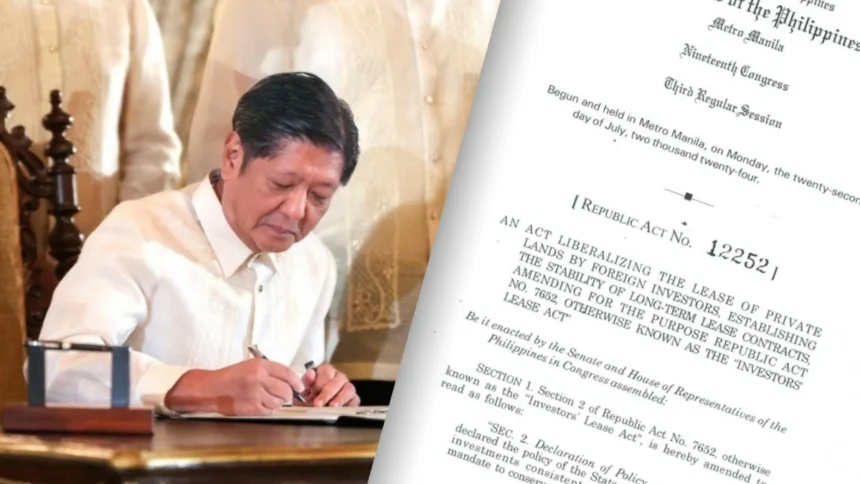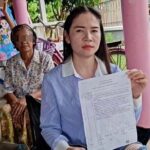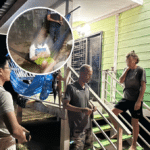MANILA – Philippines President Ferdinand “Bongbong” Marcos Jr. has approved Republic Act No. 12252, a new law that allows foreign investors to lease private land in the Philippines for up to 99 years. The law updates the current rules set by the Investors’ Lease Act of 1993, which capped leases at 50 years and offered a 25-year renewal.
With this change, the Philippines now offers some of the longest lease terms in the region, appealing to overseas investors and aiming to draw more foreign capital into areas like manufacturing, agro-industry, tourism, and environmental projects.
Malacañang announced the new law on September 6, calling it a strong step forward for the economy. Other countries in Southeast Asia, like Singapore, Malaysia, and Indonesia, have attracted investment using similar long leasing models. The law clarifies that the government wants to guarantee the strength of investors’ lease agreements, trying to build an atmosphere where businesses can plan confidently for the long term.
Republic Act 12252 lets foreign investors use lease agreements for up to 99 years, but only for projects registered under the Corporate Recovery and Tax Incentives for Enterprises Act (CREATE).
Foreign Investors Cannot Sublease
The government included protections in the law, allowing the President to set shorter lease terms for investments in areas linked to national security, like infrastructure or essential services, based on advice from the Fiscal Incentives Review Board or other agencies.
All land leased under this agreement must stick to its approved business purpose and keep within the rules of the Comprehensive Agrarian Reform Law and the Local Government Code.
The update also calls for tighter checks on leases. All agreements now need to be registered with the Registry of Deeds where the property is located, and marked on the land’s certificate of title. Failure to follow the approved use, or pulling out the investment before the lease ends, will end the contract at once.
The land owner will be able to claim damages. Foreign investors cannot sublease the property unless the contract allows, and any subleasing rights also need to be filed with the local authorities.
The Department of Trade and Industry, together with the Board of Investments and the Land Registration Authority, must release guidelines in the next 90 days. The law will take effect 15 days after publication in the Official Gazette or a national newspaper.
The Philippines is Trying to Keep up with Thailand
Many property and business analysts have praised the law, expecting it to increase investment in the country. David Leechiu, head of Leechiu Property Consultants, told the Manila Times the longer leases give firms a better chance to recoup their funds, especially in areas needing heavy investment like tourism and factories. He mentioned that hotels, now able to use land for almost a century, could help grow tourism.
This law could also help the Philippines keep up with Thailand, which for years has drawn more overseas spending thanks to better infrastructure and long leases.
Currently, Thailand allows foreigners to lease land for up to 50 years with the option to renew up to another 50 years, but only if the Land Office approves and certain conditions are met. These usually tie leases to commercial or industrial use and limit access for housing.
The Philippines, by offering a single 99-year period with fewer renewal obstacles, hopes to make itself a more attractive location for capital that might otherwise head elsewhere.
Not everyone supports the law. During its passage, Senate Deputy Minority Leader Risa Hontiveros voted against the bill, raising concerns from farmer groups about possible harm to small-scale agriculture.
Land Lease Law Disputed
She argued that bigger land leases could worsen risks to national security near Enhanced Defence Cooperation Agreement sites, where foreign groups have bought large farming areas. Hontiveros warned that the new policy could harm smallholder farmers even though it includes protections.
Representative Arlene Brosas from the Gabriela Women’s Party has also voiced strong opposition. She noted that a 99-year lease is far longer than the average Filipino lifespan, saying this rule would effectively let foreign businesses control land for generations.
Brosas said this measure puts the interests of foreign companies ahead of rural communities and workers.
Supporters say the law tries to balance encouraging investment with protecting the national good. House Speaker Ferdinand Martin Romualdez, a main author of the measure, stressed that it fits with President Marcos’ push to attract honest overseas capital.
Romualdez hopes the new rules will bring in new investors and help those already here to expand, so more jobs and better incomes can follow for local people. Republic Act 12252 is part of the Marcos administration’s sweep of changes aimed at making the country more competitive.
In the same week, the president put his name to a law setting up a profit-based tax system for large mining businesses, signalling more efforts to draw in money, technical expertise, and jobs.
With its new rules, the Philippines is aiming to clear up uncertainty that has kept wary investors at bay. If applied carefully and backed up by clear regulation, the law could unlock growth, boost employment, and support the country’s place in the fast-growing Southeast Asian region.














